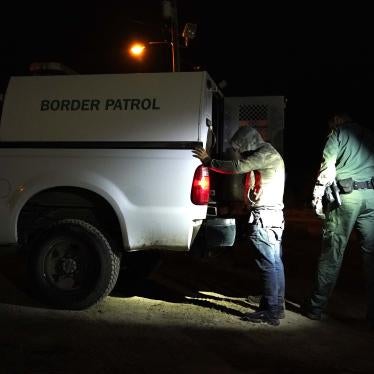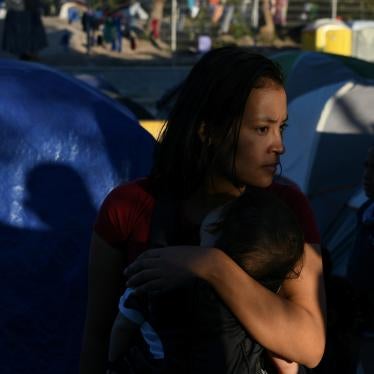Katherine Culliton-González
Officer
U.S. Department of Homeland Security
Office for Civil Rights and Civil Liberties
Compliance Branch, Mail Stop #0190
2707 Martin Luther King Jr. Avenue SE
Washington, D.C. 20528-0190
CRCLCompliance@hq.dhs.gov
VIA ELECTRONIC MAIL
Re: DHS Rights Violations in Del Rio, Texas
Dear Officer Culliton-González:
We are writing to file a formal complaint about operations of the U.S. Department of Homeland Security (DHS) and the conduct of DHS’s officers and agents in and around Del Rio, Texas. We are aware that Customs and Border Protection’s (CBP) Office of Professional Responsibility (OPR) and DHS’s Office of Inspector General (OIG) are narrowly investigating Border Patrol’s recent violence toward Haitian migrants, including CBP officers on horseback using whip-like reins as weapons against migrants. This complaint extends more broadly than the scope of those investigations, however.
As described below, this complaint complements the pending investigations and covers a range of violations committed in connection with CBP’s grotesque treatment of migrants. The clear violations of primarily Haitian migrants’ civil, legal, and human rights and dignity necessitate immediate involvement of the Office for Civil Rights and Civil Liberties (CRCL), including urgent steps needed to ensure the protection of victims and witnesses, and preservation of their testimony.
We request, in filing this complaint, an immediate dialogue with CRCL staff about a variety of serious violations of migrants’ rights documented by advocates and attorneys on the ground in Del Rio with whom our organizations have been closely in touch. These reported violations include:
● denial of the statutory and international law rights to apply for asylum, and violation of the non-refoulement principle;
● a complete absence of fear-based screening, including for affirmative Convention Against Torture claims as required even under Title 42 restrictions;
● lack of interpreters for communication with DHS officials, including those necessary to guard against (further) violations of non-refoulement; ● denial of access to attorneys and legal workers necessary to ensure migrants know their rights and are not removed or expelled in violation of law and that witnesses are identified;
● substandard conditions of nourishment and sanitation in punishing heat; ● verbal abuse from DHS guards and CBP officers/agents;
● physical intimidation from CBP officers/agents;
● physical violence, including what appear to be assaults, against migrants by CBP officers/agents;
● misleading statements made by DHS officers to migrants that they were being flown to other locations within the United States for processing when, in reality, they were being expelled to countries of origin, including instances involving a serious risk that torture will follow;
● inadequate medical care; and
● content-based access restrictions on media outlets covering the situation at Del Rio.
In addition to conducting those investigations, we implore your office to act with urgency to ensure that victims and witnesses of CBP misconduct and their families are not expelled, deported, or returned to Haiti, Mexico, or any third countries, and are permitted immediate access to counsel to understand their rights, including eligibility for U and T visas, and to assist in the investigations that have already commenced as well as that which we are requesting your office undertake.
The protection of crime victims and witnesses from immigration enforcement has long been a priority guiding the use of prosecutorial discretion (including the decisions to detain or remove). In a 2011 directive issued by then-director John Morton, ICE officials were instructed to “minimize any effect that immigration enforcement may have on the willingness and ability of victims, witnesses, and plaintiffs to call police and pursue justice.”[1] These include people who are pursuing legitimate complaints of civil rights violations, such as those affected by the egregious violence of CBP in Del Rio, and the actions of ICE and DHS to send potential witnesses and victims back to Haiti and third countries where they will experience further harm, poverty, and violence, and be unable to participate in the investigations of harm against them at Del Rio.
Moreover, by conducting immediate expulsions and removals, and engaging in the offenses and rights violations detailed here, DHS has failed to comply with the victim-centered approach embraced by the Biden administration,[2] and the recent ICE Directive 11005.3, Using a Victim-Centered Approach with Noncitizen Crime Victims (Aug. 10, 2021). The directive instructs ICE to withhold civil immigration enforcement action against victims or witnesses participating in criminal investigations.[3](§2.2). The overarching justification for taking such an approach is that “[w]hen victims have access to humanitarian protection, regardless of their immigration status, and can feel safe in coming forward, it strengthens the ability of local, state, and federal law enforcement agencies, including ICE, to detect, investigate, and prosecute crimes.” (§1). For the principles espoused by the Biden administration to be honored with integrity, it is crucial that they be applied to victims and witnesses of offenses committed by DHS personnel.
We believe it is probable that offenses qualifying for protection under this directive were committed by CBP personnel at the Del Rio site where mostly Haitian migrants converged, and by ICE in the expulsions that followed.[4] Accordingly, DHS should take steps to comply with the directive and employ discretion in the application of enforcement mechanisms[5] to the affected population, which includes all those present at the Del Rio site when these events occurred. In the meantime CBP and ICE should halt all further expulsion flights, and conduct orderly processing and parole of all migrants from the Del Rio site to safe locations (in communities and outside of detention) in the United States, where further investigations can be conducted, and the requisite immigration benefits and community support provided.
The disparate treatment faced by Black migrants, including the aforementioned violence, abuse, and denials of rights, is not only deeply concerning, but it is also unlawful. We urge your office to act with dispatch to address the violations and uphold applicable law and policy. We are ready at any time to speak with CRCL and provide evidence and context for these claims. Please contact us on Friday, September 24, 2021 to acknowledge receipt of this complaint and discuss next steps.
Haitian Bridge Alliance
The UndocuBlack Network
Black Alliance for Just Immigration (BAJI)
African Communities Together
Al Otro Lado
Aldea - The People’s Justice Center
American Immigration Lawyers Association
Americans for Immigrant Justice
Amnesty International USA
Asylum Seeker Advocacy Project (ASAP)
ASISTA
Bellevue Program for Survivors of Torture
Black LGBTQIA+ Migrant Project (BLMP)
Bridges Faith Initiative
CASA
Center for Gender & Refugee Studies
Columbia Law School Immigrants' Rights Clinic
Diocesan Migrant & Refugee Services
Florence Immigrant & Refugee Rights Project
Global Justice Clinic, Washington Square Legal Services
Harvard Immigration and Refugee Clinical Program
HIAS
Human Rights First
Human Rights Watch
Immigrant Defenders Law Center
Institute for Justice and Democracy in Haiti
International Mayan League
International Refugee Assistance Project (IRAP)
Justice Action Center
Latin American Working Group (LAWG)
Mississippi Center for Justice
National Immigrant Justice Center
National Immigration Law Center
National Immigration Project (NIPNLG)
NETWORK Lobby for Catholic Social Justice
Oasis Legal Services
Refugee And Immigrant Center for Education and Legal Services (RAICES)
Revolve Impact
RFK Human Rights
Tahirih Justice Center
The Advocates for Human Rights
Transgender Law Center
U.S. Committee for Refugees and Immigrants
Witness at the Border
Women’s Refugee Commission
CC:
Hon. Alejandro N. Mayorkas, Secretary, U.S. Department of Homeland Security Hon. Antony Blinken, Secretary, U.S. Department of State
Hon. Merrick B. Garland, Attorney General, U.S. Department of Justice Amb. Susan Rice, Domestic Policy Council
Mr. Jake Sullivan, National Security Advisor
[1] ICE Directive No. 10076.1, Prosecutorial Discretion: Certain Victims, Witnesses, and Plaintif s (June 17, 2011), https://www.ice.gov/doclib/foia/prosecutorial-discretion/certain-victims-witnesses-plaintiffs.pdf.
[2] On July 30, 2021, ICE Acting Director Tae Johnson issued a statement affirming ICE’s “duty to protect and assist victims of crime,” noting that “[t]his is true regardless of whether victims are noncitizens encountered through civil immigration enforcement activities or victims of crimes that are directly under ICE’s jurisdiction.” Statement from Acting ICE Director Tae D. Johnson on the agency’s victim-centered approach, https://www.ice.gov/statements/victim-centered-approach.
[3] ICE Directive 11005.3, Using a Victim-Centered Approach with Noncitizen Crime Victims (Aug. 10, 2021), (ICE Victims Directive) § 2.2, https://www.ice.gov/doclib/news/releases/2021/11005.3.pdf. This section states: “Assisting law enforcement partners. Absent exceptional circumstances, during the pendency of any known criminal investigation or prosecution, ICE will not take civil immigration enforcement action against victims and witnesses without approval from Headquarters Responsible Officials and may, where applicable and appropriate, issue deferred action or a stay of removal to victims and witnesses. Where available information indicates a noncitizen may be a noncitizen crime victim or witness, ICE should identify victim status as soon as practicable when victim status is unknown or unclear.” Exceptional circumstances are defined by the directive at section 3.4 as national security concerns or where a noncitizen poses an articulable risk of death, violence, or physical harm to any person.
[4] INA §101(a)(15)(U)(iii); 8 U.S.C. §1101(a)(15)(U)(iii) (listing qualifying crimes including felonious assault, obstruction of justice, witness tampering, unlawful criminal restraint, false imprisonment, and attempts to commit such offenses, as well as any similar offenses).
[5] Section 3.2 of the ICE Victims Directive provides a non-exhaustive list of enforcement actions that may be considered, including issuing, filing, or canceling a Notice to Appear; detaining or releasing someone from custody; granting deferred action or parole; and executing a final order of removal.






